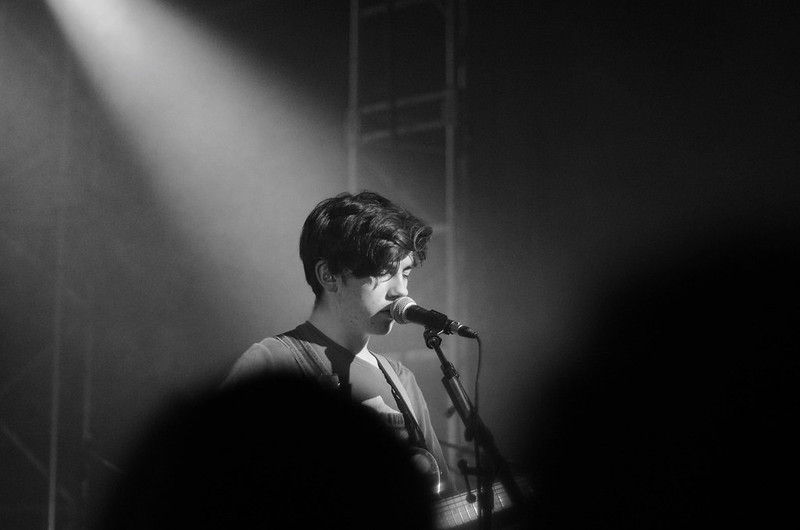Perhaps there was no better time for the release of Declan McKenna’s sophomore album, “Zeros,” than this moment in which we watch the world rapidly evolve right outside our windows. The British indie rock singer-songwriter highlights the ups and downs of how life can change with every track. Heavily influenced by music of the 60s and 70s, McKenna provides a symphonic experience with a thumping bass and moving lyrics crafted for young people today.
Sitting down with McKenna this week, it is evident the amount of dedication that was put into the album. “Zeros” is an anthem of being lost in a discovered world, about finding oneself in the recesses of our own conflicts. Change isn’t easy and it can be a tumultuous experience, a facet highlighted by McKenna in his lyrics that catapult his listeners into a world of apprehension, a world that is similar to our own current state. Although, Mckenna’s world of creation is accompanied by a dazzling array of cellos and violins with his familiar taste of heart-pounding drums and intricate chord arrangements. Daring and bold as his perspective, the musicality in which it’s supported is undeniable and tells its own story.
“It feels like the album’s kind of fallen at a time where it was sort of more real than when I was writing it. […] having such a big society as we do, having such a big world, and such a cramped world, you know, we end up with these huge problems that we cannot foresee,” McKenna said.
The album, released Sept. 4 after multiple delays, came second in the UK and Ireland Top Charts, beat out only by the Rolling Stones.
“It was kind of hilarious, like, you don’t expect to be in that position. It was just bizarre,” McKenna said. “I haven’t even had an album in the Top 10 before, so just like, even that was great, let alone, you know, coming second to The Stones was pretty good. I’ll take that.”
Problems such as this year’s COVID-19 pandemic have provided additional challenges for the singer in the release of his album. Originally set to debut on May 15 of this year, the lockdown that became the reality of many around the world ultimately forced the date back further than McKenna anticipated.
“It’s just like an emptiness releasing music and not being out there, not being able to do the things I would normally do […] Feeling like a constant output without, you know, any of the stuff that refreshes you and any of the stuff that excites you […] All of these, you know, important elements of togetherness that make up music and the music industry and the live industry are just gone,” he said.
His first album, “What do you Think about the Car?,” was widely received after the release of his hit song “Brazil” earned him the Glastonbury Emerging Talent award in 2015. It’s clear that his new take on the electrical sounds of beloved classic rock has struck a chord with many young listeners as his lyrics look to identify many social conflicts prevalent today.
“That kind of stuff is born quite spontaneously […] when writing stuff that is outwardly political often, just, that is the way it comes out best. When you’re not really thinking about the point you’re making too much and just reflecting the world, just reflecting the way things are put to you or the way, you know, you perceive things,” McKenna said.
McKenna doesn’t let his audience get away without pulling them into his glamorous examination of how we interact with those around us. Despite the complexities of society that he acknowledges, he emphasized the idea of individuality within a homogenous world.
“The world lacks a sort of large amount of unifying. Unifying identities, unifying, you know, ideas […] thinking about the future kind of gives a reflection of humanity and gives a reflection of, you know, our tendency to think we’re bigger than we are,” he said.
He developed his Zeros universe through two vaguely developed characters, Emily and Daniel. These two are derived from aspects of McKenna’s own persona and appear as figures of the all-encompassing concepts of space and humanity. Emily and Daniel are named in song titles and lyrics throughout the album.
“This sort of human level to the album is about listening to each other and understanding and, you know, people do bad things without being bad people […] The sort of need to escape is in Daniel […] Emily maybe is the one thing in the album that might put a bit of pressure on Daniel to be a little more understanding or to, you know, consider his own actions […] It ends up in this back and forth in this argument,” Mckenna explained.
To be sure, the imagination behind the album can be traced back to many various corners of daily consumption. Whether it be what’s headlining the newsstands one week or what author Yuval Noah Harari is discussing in his bestseller, “Homo Deus,” McKenna’s anthology is derived from the world that surrounds him and us.
“It became less about concept and more about, you know, my life and my feelings of… the sort of world around me and the world around, I guess, other young people like me [it’s] not always just the stories themselves that, you know, build our world, but, like, the way we tell them, as well is just like, it’s just as important,” he said.
After all, “it’s the big important things in life and you kind of try to simplify it in songs.” Not only is this an album of the resilience of young people today, it is a time capsule of our present moment in the world’s saga.
“Zeros” by Declan McKenna is available now on Spotify, Apple Music, Deezer, and YouTube Music.
Featured Image courtesy of Coralie Pilté via Flickr Creative Commons















































































































Anonymous • Dec 6, 2020 at 11:03 pm
5
Anonymous • Dec 5, 2020 at 12:47 am
4.5